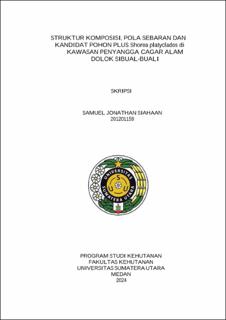Struktur Komposisi, Pola Sebaran dan Kandidat Pohon Plus Shorea platyclados di Kawasan Penyangga Cagar Alam Dolok Sibual-Buali
Structure Composition, Distribution Pattern and Candidate Trees Plus Shorea platyclados in the Dolok Sibual-Buali Nature Reserve Buffer Area.

Date
2024Author
Siahaan, Samuel Jonathan
Advisor(s)
Rangkuti, Ahmad Baiquni
Hartini, Kansih Sri
Metadata
Show full item recordAbstract
Shorea Platyclados is categorized as near endangered which is characterized by a population decline of at least 50% in the last ten years. S. platyclados (Meranti bukit) is a commercially important type of timber tree in Southeast Asia. This study was conducted to determine the structure and composition of S. platyclados, determine the distribution pattern of S. platyclados and determine the plus tree candidates found in the buffer area of the Dolok Sibual-Buali Nature Reserve (CA). Field data collection was carried out using a vegetation analysis technique in the form of a combination of paths and plotted lines with the determination of the first path using the purposive sampling method. The method used for the distribution pattern was using the morisita index while the determination of plus tree candidates used the comparison tree method. Based on the results of observations in the field, it was found that there is a large diversity of plant species that grow and develop around S. platyclados. Observations in the area found 31 types of trees from 19 tree families and 14 types of trees from 9 families from outside the CA area. Dolok Sibual-Buali. Lauraceae appears as the family with the largest number of species. The population structure of S. platyclados shows that there are obstacles in the regeneration process with evidence that it is not found in saplings up to the pole level in this species. Distribution pattern of S. platyclados in the CA area. Dolok Sibual-Buali shows a random distribution pattern with a value of Ip = 0.00. The plus tree candidates that have been determined have the highest total score found in the plus tree number 2 with a total score of 82 and the lowest in the plus tree candidate number 6 with a total score of 67, while other plus tree candidates are found in many places with a score of 68-78. This difference in total score is due to the appearance of a tree is influenced by genotypic differences, differences in the environment where it grows and the interaction between genotype and environment
Collections
- Undergraduate Theses [2145]
